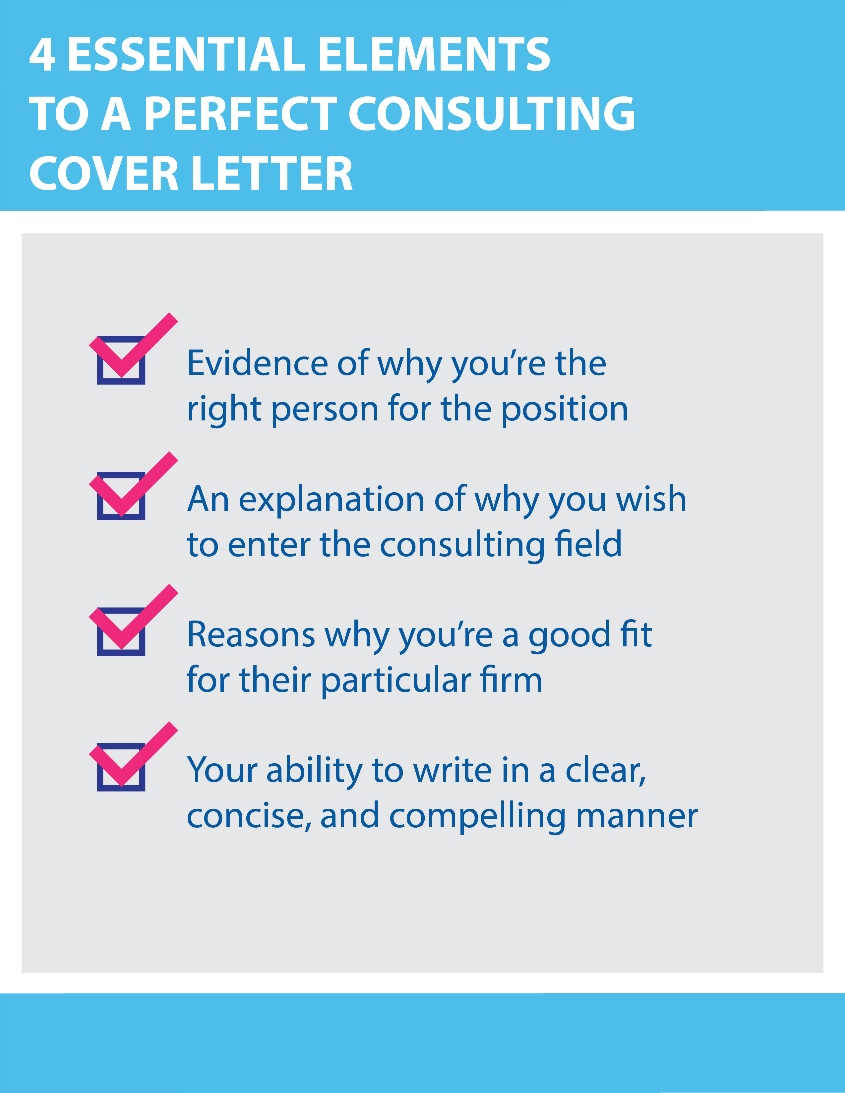FREE Resume Tips Email and Video Series
This form collects your name and email so that we can add you to our email list that delivers the free resources you are requesting. Check out our privacy policy for details on how we protect and manage your submitted data.
We’ll never spam you or share your email. Unsubscribe at any time.
Your cover letter can make a big difference when applying for a management consulting position. Because the cover letter is typically read before your resume, it plays an essential chronological role during the application process.
Consulting firms will typically read your cover letter to quickly identify what makes you different from thousands of other applicants. Therefore, writing a strong and unique cover letter can make you stand out from the competition and ensure that your achievements aren’t overlooked.
A strong cover letter presents an excellent opportunity for you to demonstrate why you’re the best candidate for the job, and to plead your case as to why the firm should hire you over other applicants.
This guide will cover 11 essential steps towards writing the perfect consulting cover letter.
Tip 1 — Know What Consulting Firms Are Looking For
The top consulting firms receive hundreds of thousands of applications each year. For example, McKinsey receives approximately 200,000 applications annually, of which only 2,000 applicants receive an offer. Consulting firms are faced with the arduous task of narrowing down the candidate pool to include only the best.
Interviewing candidates is not a cheap process. The firm wants to ensure that any candidate they interview is qualified for the position, is prepared for management consulting as a career, and is a good fit for the firm.
Therefore, top consulting firms look for four essential elements in a cover letter.
- Evidence of why you’re the right person for the position
- An explanation of why you wish to enter the consulting field
- Reasons why you’re a good fit for their particular firm
- Your ability to write in a clear, concise, and compelling manner

When reading cover letters, screeners will often ask,“Did the applicant spend enough time preparing a strong letter? Have they done their homework regarding the firm and the position in question? Do they have adequate writing skills to prepare compelling emails, reports, and presentations?“
A cover letter is a challenging document to prepare. You may feel worn out after spending hours on your resume, only to realize that you also need to spend as much time (if not more) on your cover letter.
Rather than looking at your consulting cover letter as an annoying extra step, think of it as an excellent opportunity to emphasize your skills and experiences and to set yourself apart from other applicants.
Tip 2 — Make Sure the Letter Has TheseFiveDistinct Sections
While your cover letter doesn’t need to take a formulaic approach, there are five distinct sections that should be covered. They are:
- An Introduction
The introduction should contain which position you’re applying for, your name, address, and contact information. It should also be short, sweet, and entertaining. Write it in such a way that the screener will want to keep reading into the second paragraph.
- Why You’re a Great Candidate
This is the section where you should blow your own horn. Each sentence should speak to your skills, education, and experiences — tying everything back to why you’re a great candidate. Ideally, this section should include your top three achievements to date (relevant to consulting, of course).
- Why Consulting is the Right Fit for You
Remember that the top priority of most consulting firms is to find out whether you’ll become a great consultant if hired. Even with memorable and unique qualifications, a recruiter may not be convinced that these skills will make you a good management consultant. To leave no doubt in their mind, dedicate a section towards explaining why you’re the right person for the job. You can use previous experiences (such as internships, jobs, or academic courses) to tie your career goals to the position in question.
- Why You’re Applying for the Position
The next section should cover why you chose to apply for this exact position in this firm. When laying out your case, identify unique reasons as to why you think McKinsey, Bain, BCG, Deloitte, or any other firm is your firm of choice. To make a compelling argument, identify specific people, reports, or projects that make your story believable. Don’t hesitate to mention specific employees or projects that caught your eye and sparked your interest.
- A Solid Conclusion
Finalize the letter by restating why you believe you’re a great candidate and how you can be of value to the company.
Tip 3 — LinkYour Cover Letter to Your Resume

A consulting cover letter is essentially an opportunity for you to expound on the information you wrote in your resume. What does this mean? It means that your cover letter should highlight the unique achievements, skills, and experiences (relevant to the position) that make you stand out from other applicants.
Your resume and cover letter should work hand in hand to strengthen your application further and demonstrate what makes you stand out.
Start off by identifying what you want the consulting firm to know about you. Draw attention to your career achievements. Maybe you started a business and sold it for a significant profit, or you worked overseas for a few years and have a diverse skillset.
Make sure that unique experiences are mentioned in the first few paragraphs of your cover letter to pique the interest of the resume screener.
Many resume screeners don’t actually read your entire resume.They simply scan it to identify specific items that make you stand out. Because resume screeners scan through hundreds of resumes at a time, they can easily overlook your unique achievements.
The cover letter is your opportunity to prevent this from happening. When you go into detail about achievements in your cover letter, you essentially draw the attention of screeners (and thus give yourself a better chance to land an interview).
Tip 4 — Don’t Forget About Your Resume
Even after referencing the unique skills you have in your cover letter, you need a strong consulting resume to back up your claims. A consulting resume is different from other standard template resumes, as it needs to emphasize a combination of skills that can make you successful as a consultant.
Here are resources that can help you prepare a strong consulting resume. A quality consulting resume will take just as much attention to detail as writing a strong cover letter will. In a nutshell, writing a consulting resume requires you to reflect on your past experiences, select the ones that are most relevant to consulting, and summarize them in a manner that resume screeners can easily scan and digest.
Top consulting firms typically look for the following in your resume:
- Big brand names (employers and schools)
- Strong academic performance (high GPA)
- Strong analytical skills (demonstrated in high standardized test scores)
- Strong leadership and communication skills
- Achievements versus career years (the longer your career is, the more achievements that screeners expect to see)

Also, refer to this resource to identify the top five mistakes that applicants make when writing a consulting resume.
Tip 5 — Avoid Using a Standard Template for Your Cover Letter
It’s no secret that it can be a pain to write a strong cover letter. It takes a lot of time and reflection. You’ll have to revise and edit the piece multiple times before submitting it. But, to truly stand out from other applicants, your letter needs to be interesting, personal, and unique.
The biggest mistake you can make is to copy a standard cover letter template and simply plug in your name and skillset. Screeners hate standard form letters because they’re boring to read, and they show that you’re unwilling to put in the necessary time and effort to write something unique. Because recruiters read thousands of cover letters, they can easily tell when a cover letter is written from a template.
When writing your consulting cover letter, make sure that every sentence is unique. While you may draw inspiration from various templates, add your personal twist to each word and modify it in a manner that emphasizes your unique skillset. For example, instead of starting with the usual format:
“Dear Sir/Madam, I write to apply for a consulting position….”
You can make things more interesting by starting off with what makes you different. Here’s an example:
“After attending Harvard for both my undergraduate and MBA education, I am confident in my ability to become successful as a [insert job position here] at McKinsey.”
Another example:
“My experiences overseas as a Peace Corps volunteer put me in a position to be successful as a [insert job position here] at BCG.”
The idea is to make every sentence in your cover letter count. Add a personal twist to all ofyour skills and experiences and tie them to the job responsibilities of the open position.
Tip 6 — Highlight Your Skills and Experiences via Evidence-Based Storytelling
In your cover letter, the goal should be to tell your story. Rather than simply listing your skills and abilities, demonstrate how various experiences have molded you into the perfect candidate for the position in question. Strive to show that you have what it takes, instead of telling.
For instance, instead of simply stating that you can lead, give a specific example of an experience where you showed leadership qualities. This evidence-based approach shows recruiters that your prior experiences have equipped you with the necessary skills to be successful.
Telling a story makes your cover letter much easier to read. It also makes you stand out from thousands of other applicants who may simply state “I’m a leader,” or, “I’m a hard worker.”
As you use this evidence-based approach, tailor every experience you mention to a specific skillset that is required for the job. If the position requires a candidate with strong interpersonal skills, explain a time when you worked within a team to achieve tangible results. Also, list out any challenges and how you overcame them.
It’s not simply about telling a story. Rather, it’s about telling a story that highlights why you’re a good fit for the job, as well as what makes you stand out from the competition.
Tip 7 — Show Your Value
A common mistake that many applicants make is to only think about personal achievements when applying for consulting positions. Recruiters often read through cover letters that have lots of “me meme” in them.
This is to say that many applicants focus on how they can benefit personally from the position in question, instead of demonstrating how they can become valuable employees (and eventually partners).
Many cover letters talk only about how the candidate will be able to elevate his/her career, experiences, and skills. Such letters only focus on personal goals instead of demonstrating how you can help the company become better. Remember that screeners are looking for candidates who will be of benefit to the firm, not those who are simply using this as an opportunity to enrich themselves and their careers.
When writing your cover letter, emphasize how your skillset will be of benefit to the company. To do this successfully, you need to do your research with regards to what the short-term and long-term goals of the firm are. You can then use these goals and relate them to your unique abilities and experiences.
Tip 8 — One Page Is the Perfect Length
It can be tempting to write a long cover letter, especially if you have a diverse skillset that you feel should be highlighted. However, being concise and keeping it relevant to the position is a much better strategy.
Aim to select only the most relevant experiences that apply directly to the position you’re seeking. You can typically fit these experiences in only one page.
Being concise also makes it easier for recruiters to read through your cover letter quickly without overlooking anything. Edit it down to a concise letter by re-reading and adjusting your original cover letter. The more you read it, the more unnecessary words and content you will find to take out.
Start early so that you can give yourself plenty of time to adjust your cover letter accordingly.
Tip 9 — Be Specific About the Position You’re Applying To
While this may sound obvious, many applicants tend to go off on a tangent about their skills and abilities without first mentioning the job they’re applying for. You should always state the position and office of the job you intend to apply for within the first sentence.
Remember that this information can still be included as you emphasize what makes you different. Here’s an example of an opening sentence that was used earlier in this guide:
“My experiences overseas as a Peace Corps volunteer put me in a position to be successful as a [insert job position here] at BCG.”
Being specific and concise about the job you’re applying for will make it easier for screeners to quickly recognize which position you are interested in.
Tip 10 — Give Yourself Time to Write a Quality Letter
Similar to consulting resumes, writing a strong consulting cover letter takes time. To be successful, you need to consider everything you’ve accomplished as well as what makes you different from everyone else. Don’t think that you can write a strong cover letter in one night. It requires multiple iterations, careful re-reading, and timely feedback.
You also need to make sure that the cover letter blends seamlessly with your resume, and it expounds on the outstanding skills and experiences contained in the resume itself.
Tip 11 — Proofread Thoroughly

And finally, make sure you eliminate any grammatical or spelling mistakes from the final cover letter. These mistakes make you appear careless and can result in being disqualified in the screening process. Don’t let something so simple be your downfall.
Take time to proofread. Ask peers and fellow professionals review your cover letter and give you feedback as well.
Example
Here is an example cover letter that highlights the tips I’ve mentioned. Reference this example as you write your cover letter to make sure that you hit all of the important sections. These items do not necessarily need to appear in the order I have them listed. But, make sure that they are all represented in your cover letter. Below is an example consulting cover letter.
You can also download the example by clicking here.

More Resources:
Free Case Interview Prep Program – Sign Up For Free Instant Access to the Largest Collection of FREE Case Interview Training Resources.
We’ll never spam you or share your email. Unsubscribe at any time.




219 thoughts on “Consulting Cover Letter Tips (and Template)”
Dear Victor,
I would appreciate if you didn’t publish my website (I included it in my previous comment).
Thanks
Hi Victor,
Reading your post was a great insight. I am recent college graduate with a degree in Global public health from a small liberal arts school (under grad gpa 3.3). I have great work experience in the non profit and sound thesis research experience. I have plenty of extra curricular showing leadership, public speaking and I have a small independent entrepreneurship project on the side.
I am looking to join Mckinsey because I seek the extensive analytical and disciplined training.
I can probably even get some contacts.
Can you advise me on the best way to stand out and apply?
also, what if I got an email address for a former high level mckinsey consultant and sent him an email reinforcing my dedication and drive to get in? Would you advise that?
thanks
Farah,
Your background would be considered at the very low end amongst consultants working at McKinsey. The GPA is low (especially for a non target school, if you had a 3.8 at a non target school that would a different all together, the prestige factor of your school probably isn’t on the target school list, and your experience isn’t one normally seems as compensating for the other areas of your background (for example if you had the above and was currently working at Goldman, that would give the recruiter pause and prompt him or her to say maybe we should take a closer look).
So as starting point, this would be a long shot (but not impossible) situation. Here are a list of offsetting factors:
1) 95% tile or higher on a GRE or GMAT or SAT especially in math
2) knowing someone who has had a chance to evaluate your analytical skills via a case and is willing to endorse you
3) truly exceptional case interview performance. Given your background, merely good performance isn’t sufficient. You need to do it measurable better than the Harvard grads.
In terms of your contact, emphasizing your drive and determination will have very little impact. Instead, you need to explain how strong a candidate you are even though your resume doesn’t convey this (at least by the very high McKinsey standards).
You will need to realistically do a LOT of networking and expect to face skepticism at every turn. Expect an informal case, mainly so the (being honest here) the other person can confirm your skills aren’t strong enough and discourage you from applying.
BUT, if you blow them away on the case, THAT will get noticed. Keep in mind this is not the case interview, this is the case they give you in the middle of lunch or during a networking phone call that determines where they will endorse your resume and request to get a real case interview.
I received a note from a FFY with a very similar background as yours who got offers at Bain, BCG, and McKinsey. He did 400 practice cases and tried calling close to 2,000 people (i think that was the number) working at MBB to get considered.
The process evolved as I describe above. BCG and McK refused to interview him, but BCG changed their minds once he showed them the Bain offer. And McKinsey changed their mind once he showed them both the Bain and BCG offers. All in, I would estimate it took him 600 – 1,000 hours to get it all done. Clearly he was VERY determined to both get considered and be good enough to be worth considering.
Victor
Hi Victor,
Reading some of the previous comments here has been very educating. I have a background in geology, a postgraduate degree in geosciences and an MBA(Oil & Gas management) from a non-target school. However i’d like your views on some concerns.
1. my undergrad gpa is not very impressive (2.2)
2. during my MBA and post-graduate geoscience my grades changed significantly (on a scale of 5.0 i scored 3.9, this corresponds to a Postgraduate merit in UK system)
3. I also did take the GRE test and scored a 690 out of 800 (quantitative score) with an overall score of 1290.
4. I have 3 years of work experience having brand names clients in Oil and gas industry.
i just finished my MBA and looking to go into consulting, what are your thoughts.
Regards
Hi Ay,
The undergrad GPA is pretty low by consulting standards. You might be able to get away with omitting it on your resume if you have enough work experience. If you get asked about it, you do have to disclose it and you should have a good explanation ready for why it was so low.
Your MBA and GRE scores puts you in the top 8 – 25 firms. Your numbers are probably not strong enough for the top 7. This could be offset by having contacts in your target firm or if the caliber of your previous employers and the b-school is very strong.
It doesn’t hurt to apply, but definitely don’t only apply to the top 7.
-Victor
Hello Victor,
Many thanks for your reply and really appreciate the effort you have taken to respond. As you rightly stated, it doesn’t hurt applying to the top 7 alongside the other consulting firms.
I have consulted for the some of the major oil n gas companies (Shell & Chevron) in my previous jobs. How does the consulting industry perceive the companies?
Ay,
Shell and Chevron are well known F500 companies. As employer or client names, they are well respected. The more important factor will be looking at what kind of work you did for them and assessing the results of that work.
-Victor
Hi Victor,
first of all THANK YOU for this article… currently one of the most interesting on internet.
I’m 23 from Italy with a bachelor and master’s degree in Mechanical Engineering (101/110 and 109/110 respectively) with a M.B.M. obtained in 2011. Moreover I have been working in one of the biggest firm about thermic comfort in the world since 2011 (March) and my role is Technology Analyst in Strategic Marketing Department.
I focused all my education course to become a McKinsey consultant, so:
1) how do you think I can emphasize my course through letter? (in particular my age… I did a lot of things at the same time to have my master’s degree 10 days ago!)
2) During my work I often ran into McKinsey’s reports, do you think this could be useful in order to emphasize my work experience?
3) I met a person who currently is a Business Analyst in McKinsey. You wrote this is a plus and I should report this info in my letter but do you think I should have his approval?
Ops, I wrote really much… sorry!
Thank you again!
-Massi
Massi,
For #1: write down all the things that make you different than your peers. Sort them from most unique to least, and then emphasize the first 1 – 3 items in your cover letter. You want to be both a) qualified and b) unique.
For #2 – it is fine to mention you ran into McKinsey reports in your work. It probably helps a little, but not enormously so
For #3 – it is not necessary to ask permission from the McKinsey BA you met to mention him or her in a cover letter provided your focus your comments on YOUR reactions to meeting this person. It is not a bad idea to ask for permission, but mostly to signal to this BA that you are applying. You might send your cover letter (when it is 110% ready to go) and resume to the BA for his or her “approval” on the off chance he or she might be impressed by it, and turn it into the recruiting department on your behalf with an explicit or implied endorsement.
Only do this if you felt you made a strong impression on this BA and that he or she remembers you. If it was just a passing interaction, then you probably want to avoid this and just mention your reaction to meeting him or her.
-Victor
Hi Victor,
I’m a recent graduate from the University of Virginia and I recently realized that I might actually like consulting. I have a non-business undergrad degree but I got graduated with Honors in an Honors Program, I have a close to perfect math SAT score and A’s in the two calculus classes I took in college.
Is it too late to for me to apply in November of the fall recruitment cycle? Should I wait for next year instead? I want to get into a top consulting firm but I don’t want to risk jeopardizing my chances of getting in just because I applied off-cycle (in combination with applying out of campus and having a non-business background). If I get rejected by a firm once, does that hurt my chances when I apply for the next cycle? Also, how do I balance taking the time to network (and hence write a good cover letter) with trying to apply as soon as possible? I don’t want to keep putting off applying though because I still want to do either a JD or MBA degree after a 2-3 year stint at consulting.
Thanks!
Claire,
If you’ve already graduated, you’ll most likely need to apply as an experienced hire (different recruiting team internally, different calendar — more rolling, not tied to campus generally). If in doubt, just call the firm in question and ask what the best way to apply is. They are a little busy this time of year, so try calling before 9am or after 5pm to catch someone live.
Applying off cycle is rarely a negative. At worst, they say we’re putting your resume in the pile for next cycle. With the exception of McKinsey, if you don’t get an offer it doesn’t negatively impact you in you apply again. At McKinsey, if you take the PST and/or get through one or more rounds, they ask you to wait 18 – 24 months before applying again.
Now if you don’t get selected for the PST or the interview, it doesn’t hurt to reapply again. This is more of a “you got lost in the shuffle” issue (happens all the time) as opposed to the firm evaluated you in person, didn’t think you were ready yet, and then rejected you (which is different).
You seemed very concerned about this issue, and in my opinion sure it’s an issue, but it’s a relatively minor, somewhat logistical, concern.
Since you’re most likely applying non-campus, take the time to network and find yourself an “in” at each firm you’re looking to reach.
If you apply online, that generally only works if your resume is awesome — target school, big name employers, high GPA and/or high test scores. You can do both. They are not mutually exclusive.
Online applications, where you are lumped in with the masses (e.g., the many unemployed people who apply to 10,000 firms in 30 days by blasting their resume indiscriminately everywhere), the initial screen is more or less a keyword search filter. It’s done by either an administrative type person or increasingly by a computer.
Harvard resumes get kicked out to a human reviewer. Local community college resumes don’t.
-Victor
It is just so frustrating sometimes to write cover letters because everything you want to say has been said on the companies website! I genuinely want to join a management consulting firm due to my love for problem solving and also due to the fact that I have to opportunity to collaborate with other brilliant people but I was told that these reasons were bland if I were to put them in my cover letter.
Joe,
Then say that, and then acknowledge you know they’ve probably heard it before, but its definitely why you’re interested. If you can include references to any people at the firm you know or have met or reference any prior work they’ve done or what you’ve read about the firm, those are worth doing to demonstrate serious thoughtful interest.
-Victor
Victor,
Thanks for the great first-hand experience.
I have a question regarding my own situation:
I entered consulting early building an own small consulting business selling my own knowledge and skills during my Bachelor and Master studies. Even though these were not large scale strategy projects with multi-million budgets, of course, I managed projects of increasing scale and complexity, including a project abroad in Asia, and the latest one at a MNC being part of a project directly under the group’s board and realizing a multi-million budget for execution of the strategy and roadmap we developed. At that time, I had just finished my Master’s.
While my career plan was to enter a consulting firm, I was offered the opportunity to build a new country from scratch for a well-known MNC. Within a couple of months I took the company to #2 in that market, before making the decision that I want to get back into consulting and build my career there.
While I believe that my professional experience qualifies me well for top-tier consulting firms, my weak points are my academic records. Even though I graduated from one of the top-tier universities in my country, my MSc GPA is just 3.6, and my BSc GPA is even lower, and having some ugly Fs in a few courses.
Is my professional experience enough to compensate for my weak academic results? Do you think it makes sense to study for a MBA first to get a better GPA and the degree on my resume before getting back into consulting?
Philip,
Your experience sounds very strong. It’s a definite plus. The MsC GPA of 3.6 out of 4.0 is actually considered pretty good if it’s a target school in a quantitatively oriented program.
The F’s are a big problem. If they undergrad is substantially below a 3.5, you’ll need to include a an explanation of why they are so low. In addition, high standardized test scores like a GMAT would help paint the picture that your undergrad grades were due to a lack of focus as opposed to a lack of ability.
The more you work, the more degrees you get, the more the undergrad grades fall off in terms of relevance.
I wouldn’t recommend getting a MBA solely to apply for consulting jobs. But, if the MBA is in your plan regardless and you did well, it provides more data that undergrad grades were a lack of effort issue as opposed to lack of ability. Again, you’ll need to explain WHY you didn’t put much effort into undegrad studies.
Personally, I would try applying now and seeing what happens. Test the “market” and see what you’re up against. Applying as an experienced hire, they will look more at your professional accomplishments than the academic (relatively speaking), so you might have enough to get considered.
-Victor
Dear Victor,
Thank you for this amazing resource. I have just read the tips on writing a winning cover letter for consulting jobs. Very informative.
I have recently completed my PhD and also have two masters. I am drawn to work in consultancy. Without much work experience, do you think my educational qualifications give me any advantage?
Emeka
Emeka,
I think the PhD is neutral in terms of qualification. In general, the firms are looking for the best at each level of education. So they’re looking for the top X% of the MBA’s, the top X% of the PhD’s, etc…
Of all the firms, McKinsey probably values PhD’s the most, followed by BCG. McKinsey in particular stared hiring PhD’s first and have a fairly large training infrastructure to train new PhD’s and postdocs in business.
The smaller firms tend not to prefer MBA’s unless its say a life sciences consulting firm where the PhD knowledge IS the main expertise being consulted on. If it’s a more general business strategy firm, the smaller firms often are setup to train someone with great raw talent but no actual business experience.
Amongst the PhD’s what the firms will look at are the selectivity of your schools (include masters and undergrad), the prestige level of the specific program you’re in, your GRE scores, and work history / publishing history.
-Victor
Hi Victor,
Thanks for your feedback. Certainly informative.
Emeka
Hi Victor,
I am trying to get into consulting without any prior related experience. I have a high GPA from a non-target but recently separated from the military where I was a Chinese translator and just wrapped up an internship at Goldman. Would these items be enough to make me stand out in a cover letter/resume, or are they still too irrelevant to consulting?
Thanks for your help,
Amarezza
Amarezza,
Emphasize the internship at Goldman. The Goldman name opens doors. Not a guarantee, but with Goldman I’m fairly certain they will read your resume very carefully (as opposed to just skim and toss it).
The high GPA is useful, but its non-target so it is hard to gauge whether a high GPA at a non-target is better, same or worse, than say a 3.5 at Harvard. If you have high standardized test scores, especially in math, DEFINITELY include those. High math Goldman will definitely be considered.
-Victor
Thanks Victor. This put a few things in perspective for me now.